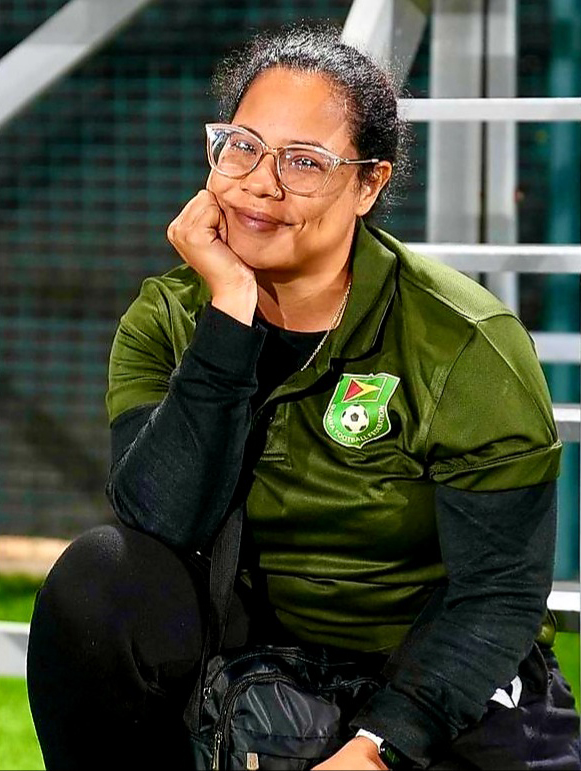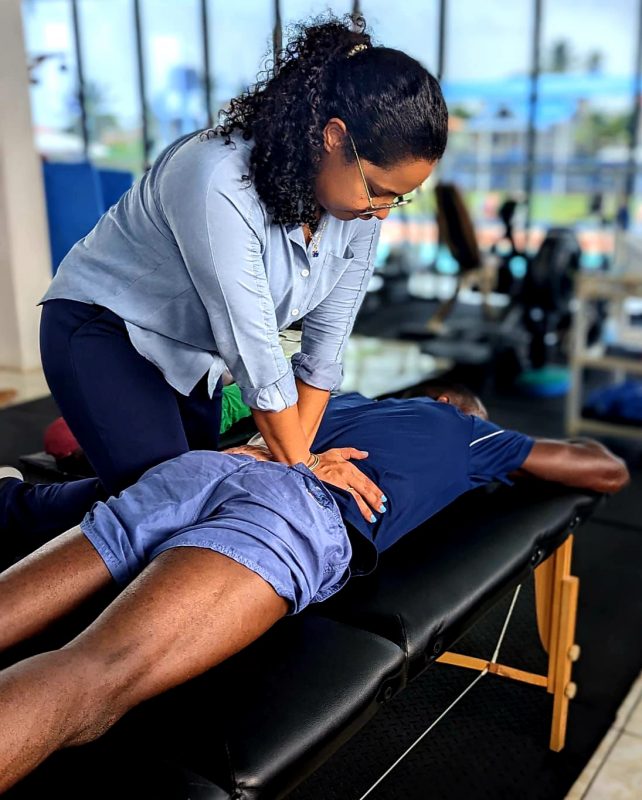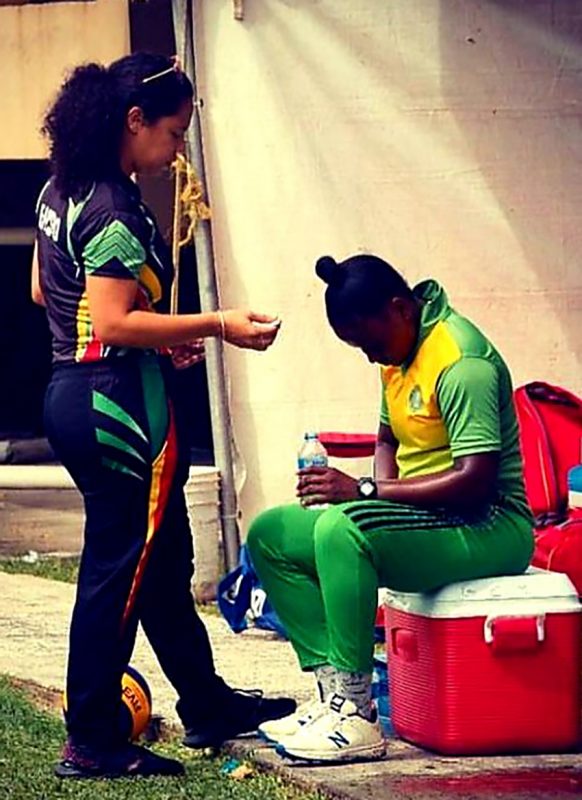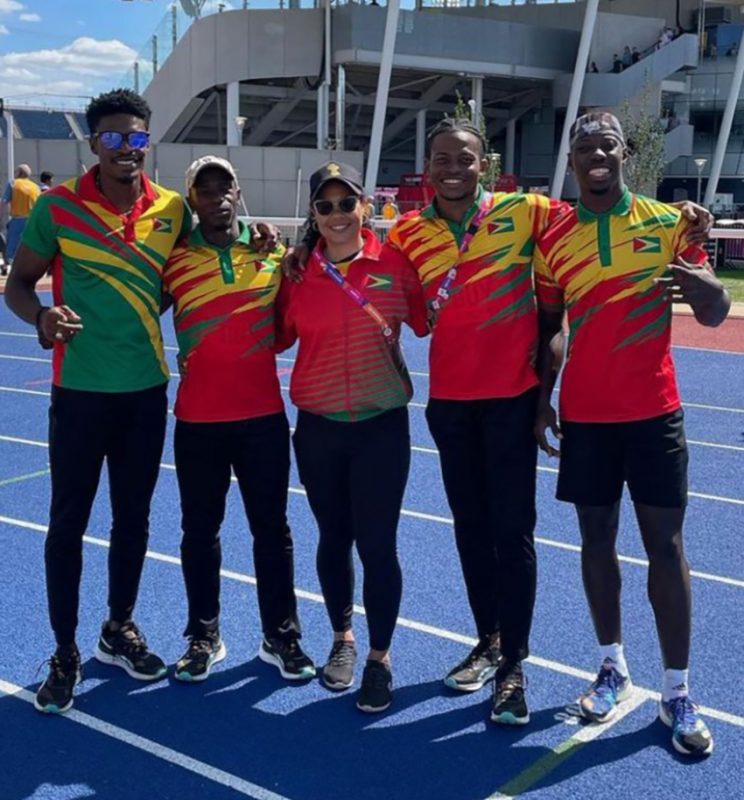Sport physiotherapist Jana Edghill hopes to continue working on a plan to elevate and expand the standard of practice in her field in the public sector and is doing so along with a team of sport physiotherapists now based at the National Sports Clinic and other parties.
“We have a great team at the clinic led by physiotherapist Vanessa Wickham, who accompanied our athletes at the recent Carifta Games in Grenada, that did so well. When you think about it, athletes pay a lot for assessments and therapies in other countries where the services are not easily accessible. Here it is free of cost. You just come in and we take a look at you,” Edghill told Stabroek Weekend in a recent interview.
“From the humble Castellani House, where we were prior to moving the clinic to the National Aquatic Centre, we have made a lot of strides and I am really happy to be a part of that. We have a lot of athletic talent in Guyana, yet to bloom, and if I have the kind of skills to get that talent to a next level, I want to help.”
Her desire is to be a part of a team that raises the standard of practice of athletes to the elite level, the world championships and the Olympics.
“We have been there before, not necessarily with the physio team we have now, but we have the capacity to do it now. I want to see our athletes do well,” she said.
A staffer of the National Sports Clinic (NSC) and in her seventh year as a physiotherapist Edghill, 29, is now in her second year working with the Golden Jaguars, Guyana’s senior men’s national football team.
She is also pursuing, simultaneously, two master’s degrees. The first is in sports and exercise medicine at the University of the West Indies, Mona Campus. The second is in healthcare management through the Guyana Online Academy of Learning (GOAL) scholarship programme. She expects to complete both programmes by the end of this semester.
Tours of duty
After completing tours of duties at the rehabilitation department of the Palms Retirement Home, Georgetown Public Hospital Corporation (GPHC), two rotations at the Ptolemy Reid Rehabilitation Centre (PRRC) and an 18-month rotation in Berbice, she was assigned to the National Sports Clinic where she has found her niche.
At the Palms, the focus was on neurological conditions such as strokes, spinal cord injuries and traumatic brain injuries. “At that time, I was very green in the profession so I wasn’t drawn to an area of specialisation,” she said. At the GPHC, the focus was on orthopae-dic conditions and at the PRRC, the focus was on persons with disabilities.
“Working with children is not an area where I necessarily excel but I believe once you’re doing something, you do it to the best of your ability. The children grew on me after a time and one of the things I took away from my rotations at Ptolemy Reid was a lot of patience. I’m so grateful for that experience,” she added.
When she was assigned to supervise three orthopaedic departments in the Region Six (East Berbice-Corentyne) health department, the Covid -19 pandemic struck. “It wasn’t the best time to grow the service in the area. We had to provide rehabilitation services in Region Six. We had departments at the hospitals in New Amsterdam, Port Mourant and Skeldon. We could not expand in the way we wanted to because of Covid-19. Our aim was to have a physiotherapist in every region. When I got to New Amsterdam where I was based, there was no physio at the time,” she recalled.
Her stint was supposed to be for a year but she stayed for 18 months then returned to the city and was assigned to the National Sports Clinic housed at the National Aquatic Centre compound, Liliendaal.
National Sports Clinic
By the time Edghill began her stint at the NSC she had started the master’s degree programme at UWI.
“It is a very intense and very orthopaedic-based programme that has given me a lot of knowledge on how to deal with sport-specific injuries and to analyse an injury more in-depth. Because it is also orthopaedic-based it can be related to non-athletes,” she said.
The University of Guyana (UG), where she obtained a bachelor of science degree in medical rehabilitation, does not offer any post graduate courses in that area and she wanted to continue in the same field. When she started the programme at UWI she had already known she liked working with orthopaedic cases, dislocation, fractures and muscles.
“My intention was to study sport and even though it was sport it could also relate to any orthopaedic condition. After joining the National Sports Clinic everything kind of snowballed…. I was getting all this knowledge and skills on sport-related conditions and I started to apply them to the athletes with favourable results. At the clinic my love for working with athletes grew. It had a domino effect and I started travelling with sports teams. I got so many opportunities to work with national teams and national athletes to the point where I’m assigned to the Golden Jaguars which is a great experience. Every day I’m grateful for that,” she said.
The National Sports Clinic is an arm of the physiotherapy department of the GPHC. It was designed to provide a service for national athletes in any sport for any sport-related injury. Originally it was housed at Castellani House before it was moved to the National Aquatic Centre. Since the move, Edghill said, the clinic has expanded and is better equipped.
“We have more equipment. We have six staff members and we see all the national athletes from all the sports you could imagine – boxing, weightlifting, football, track and field, everything, for assessment, physiotherapy treatment and advice on techniques for injury prevention and proper form. The clinic has grown, not just physically but we now have a pool of physiotherapists who are interested in sports. We are trying to increase our knowledge day by day on how to work with our athletes. Physiotherapy in general is one thing but working with athletes is another,” she added.
The clinic is ideally located, she said. “The pool is very important to the athletes’ recovery. We use it for hydrotherapy sessions and sometimes for strength and conditioning, especially if games are coming up. Hydrotherapy is not just for the athletes but for stroke patients and patients with orthopaedic conditions like hip replacement or any body part replacement, back pains among other things. You have to be part of the clinic to access the service,” she explained.
Golden Jaguars
In January 2023, one of the Golden Jaguars players had an injury and he was being treated at the clinic when the head coach said the team was looking for a physiotherapist to work with the local players when they train in the country.
“We discussed the plans to raise the standard of treatment and medical services for the Golden Jaguars. I decided to give the players a try. I was hoping for the experience because this is how we gain knowledge and experience and pass it on. Since then I joined as an ancillary staff of the team on the Concacaf Nations League qualifiers’ tour to Bermuda, Barbados, and Antigua and Barbuda. The team is now training for the World Cup Qualifiers in June,” she revealed.
More recently she travelled with the team to Saudi Arabia for the FIFA Friendly Series where the Golden Jaguars played two games losing one and winning one. “We won the match against Cambodia but we put up a fight against Cape Verde, a higher ranked team, and ended up with nil-one in favour of Cape Verde,” she said.
Her first travel experience with athletes was to the Junior Pan Am Games in Cali, Colombia in 2021 and after that she accompanied athletes to the Commonwealth Games in Birmingham, England in 2022.
“I was also fortunate to be attached to the Guyana female cricketers for their regional cricket that was held here. After that, football took over most of my travel experience,” she said
“I have never had an experience where I was disrespected in any way nor have they expressed concern or discomfort that I did not know what I was doing working with them. For me, I don’t even think about genders. I carry myself as a professional and I always keep that at the back of my mind. It is just about loving what I do to the best of my ability and keeping my head on in helping and guiding those who need assistance in my field,” she said.
The most common injuries among athletes are lower body injuries such as ankle sprains, hamstring issues, knee pains and ligament tears, especially in football.
At what stage she brings the doctor in? She said, “Maybe, I am biased and this is just me tooting my own horn, but I do believe that in some cases, especially with sport-related injuries, the physiotherapists do better assessments because we understand how the injury works and we have been trained to understand the mechanics of it. When a physiotherapist assesses an injury, it is quite an in-depth analysis of the injury. We also look at the things they eat, their rest patterns, supplements and hydration. We do a lot of tests, we look at outcome measures and fitness tests among other areas.”
She would only bring a doctor in if there was a need for some medical imaging/tests or blood work. “Then we would bounce ideas off of each other. There are stages when we do need a doctor’s involvement. We are not allowed to write prescriptions or give injections. When it comes to medical procedures, well yeah, we call in the doctor. However, 80% to 85 % of the time when an athlete comes with an injury they come to a physiotherapist for assessment. You hardly find them going to a doctor unless they need some sort of medical intervention,” she stated.
Becoming a physio
The past student of Marian Academy had always wanted to work in the medical field so she enrolled at UG to study medicine but that did not pan out well for her. “I think I wasn’t as disciplined as I should’ve been. One day a friend told me about the medical rehabilitation programme also known as the physiotherapy programme at UG. I didn’t even know that UG was offering that programme. However, I was exposed to physical rehabilitation through my own sports injuries and it was always something I had actually wanted to do since I was always active in sports or around sporting activities,” she recalled. She has played volleyball at the national level and even though she does not play any sport at present, she still enjoys working out at the gym.
Edghill decided to switch to physiotherapy. “I didn’t just want a career for the sake of a career. I knew though that I wanted to do something in the medical field. After switching to physiotherapy, I enjoyed every minute of my tertiary education and the rest is history,” she said.
“You don’t have to do a sport or have an interest in sport to do physiotherapy. There are so many areas that you can fall into in physiotherapy. Even if it is not physiotherapy, you should do things that you love. If you do things that you love you will go a far way.
“I learned a lot, not just about sports but how physiotherapy can be applied in children, the elderly and with persons with disabilities and how it can make our lives easier by preventing injury and pain.”
Because physiotherapy was a new programme at UG she was a part of its early developmental stages. She was in the third graduating class of three in 2017. The then three newly-minted physiotherapists graduated in November 2017 and the following month they all began working in the public sector. “It was a great opportunity for us,” she said.
She is conscious that people are becoming more aware of the importance of physiotherapy and that it is more than a massage or the demonstration of two exercises.
What’s next? She said, “Right now I’m focused on my career and taking it to the next level. I’m making my contribution and I am happy where I am. I’m also paving the way for the younger physios coming behind me to get it a bit easier.”
She said that ten years ago physiotherapy was a service that was not even recognised as something that the Ministry of Health offered, much less something offered to sportsmen and sportswomen.
“I’m grateful to the people who paved the way for me – Beverley Nelson, Barbara Lawrence, the late Janice Simmons, Dr Arianne Mangar who is currently my director and Cynthia Massy who was at Ptolemy Reid when I did my first rotation there. If they didn’t give me the opportunities or teach me the things that I now know, I wouldn’t be here today,” she said.
A fun fact? She said, “I can sing really well in the shower where I like to have my own concerts.”








